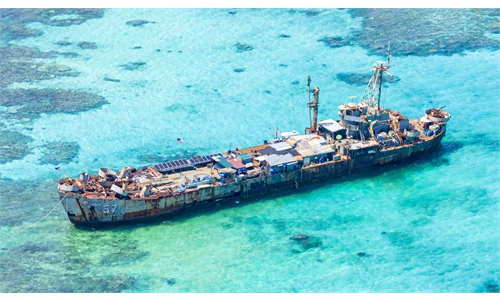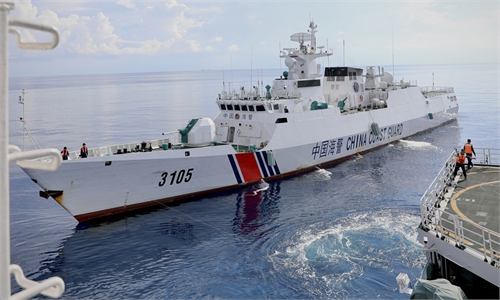
Illustration: Liu Rui/GT
In recent years, the situation in the South China Sea has remained tense, with sovereignty disputes under great power competition constantly threatening peace and stability. The question that must be asked is whether a military conflict in the South China Sea is imminent.The Philippines has become increasingly aggressive in the South China Sea, frequently sending Coast Guard vessels into waters near China's islands and reefs. It can be foreseen that more provocative actions by the Philippines and China's firmer measures for rights protection will make the probability of conflict between the two sides rise.
Philippine President Ferdinand Marcos Jr claimed in this year's "Shangri-La Dialogue" that, if the death of any Filipino citizen occurs at the hands of another country in the South China Sea, it would be very close to an "act of war." But we believe that China will not be shaken by his words. China will firmly protect its legitimate rights in the South China Sea in the face of any provocations and infringements. The Philippines needs to better keep this in mind.
The provocations of the Philippines in the South China Sea run contrary to the national interests of the Philippines, and are supported and incited by the US and other forces outside the region. Through joint military exercises with the Philippines, the militarization of the South China Sea has been further strengthened, increasing the risk of armed conflict between China and the Philippines.
If such a conflict were to occur, the Philippines would face serious consequences. The Philippine economy would be severely impacted, with maritime trade being disrupted and economic losses being immeasurable. In addition, the security situation in the Philippines would face severe challenges. The country, unable to make independent decisions, will either bear huge military, political and economic losses, or become further embroiled in conflict under US control. Such a scenario is not in the interests of the Philippines and is something that the majority of Filipinos do not want to see.
At present, the military alliance established by the US around the South China Sea has basically taken shape, and the South China Sea issue is rapidly spreading from the political and diplomatic fields to the military and security level.
The US is sparing no effort to prevent China from becoming a global power. Within this strategic mind-set, the South China Sea is viewed by the US as a crucial element in maintaining its dominance over the Western Pacific. The US has notably ramped up its military presence in the South China Sea in recent years, moving toward making the militarization of the area a normal and institutionalized practice. These strategic currents and military maneuvers not only exacerbate tensions in the South China Sea but also threaten the peace and stability of the region.
In this context, some in the US are claiming that a military conflict between the US and China in the South China Sea is no longer a question of "if" but "when." However, the ties between the US and China are increasingly complex and extend far beyond the South China Sea issue. History has shown that if a conflict with China were to take place, the US would have the will, mechanisms, and capacity to quickly adjust its strategies and minimize the impact of such conflicts. But, in the case of the South China Sea issue, the Philippines would only be treated as a pawn by the US, and the country's interests would be sacrificed.
The South China Sea dispute has a long history, but this does not mean that peace in the South China Sea is unattainable. As long as all parties involved maintain a rational and pragmatic approach, embracing a spirit of cooperation and mutual benefit, the situation in the South China Sea can certainly be eased and managed effectively.
China has no intention of engaging in armed conflict with the Philippines, the US, or any other country in the South China Sea. China is always open to dialogue, negotiation and mutually beneficial cooperation.
The US side should abandon its Cold War mentality and focus more on actions that contribute to regional stability. Only through mutual trust, cooperation and a win-win approach can the dawn of peace in the South China Sea become a reality.
The author is an associate professor and assistant director of the Collaborative Innovation Center for the South China Sea Studies at Nanjing University. opinion@globaltimes.com.cn



